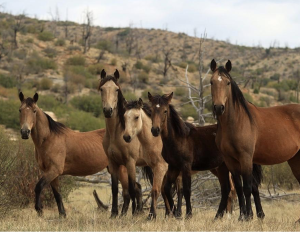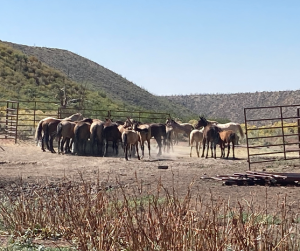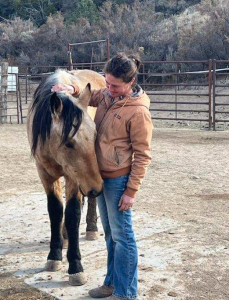Editor’s Note: We welcome the National Mustang Association of Colorado as a new sponsor at Cayuse Communications! The non-profit organization successfully gathered horses from Mesa Verde National Park, and, after starting them with positive reinforcement methods, is pleased to offer this horses for adoption. Check them out here.
 From the NMACO:
From the NMACO:
Horses have lived in the canyons and mesas of Mesa Verde National Park for hundreds of years, long before it became a national park. Some historians believe that the Mesa Verde horses trace back to the original Spanish horses of the exploring conquistadors, and DNA testing of a recently captured stallion confirmed almost one-quarter Spanish genetics.
Sadly, the Park is required by its legislative mandate to remove all wild horses from the Park. Wild horses in national parks are not covered by the Wild and Free Roaming Horse and Burro Protection Act of 1971, as the Act protects only horses on BLM or Forest Service lands. The Park has concluded that the horses conflict with its mission, which is to protect the antiquities and ruins within Park boundaries.
Drought conditions in recent years have resulted in the loss of natural water and forage historically relied upon by the wild horses and resources in the park cannot support their survival. In summer of 2014, several horses died in the park, most likely from dehydration. Public outcry led to organized protests at the park.
 NMACO decided that our energy would best be directed toward whatever would best help the horses. We advocated a low stress, non-adversarial habituation, bait-trapping plan that would condition the horses to a trap pen and ultimately lead to better domestication and adoptions with the least amount of trauma. When the park released its draft Environmental Assessment for public opinion in May 2018, we submitted additional suggestions and comments. Finally, after more meetings with park administration, the bait trapping plan was selected as one of the preferred methods.
NMACO decided that our energy would best be directed toward whatever would best help the horses. We advocated a low stress, non-adversarial habituation, bait-trapping plan that would condition the horses to a trap pen and ultimately lead to better domestication and adoptions with the least amount of trauma. When the park released its draft Environmental Assessment for public opinion in May 2018, we submitted additional suggestions and comments. Finally, after more meetings with park administration, the bait trapping plan was selected as one of the preferred methods.
The pilot program of low-stress, habituation gathering helps to mitigate any animal welfare issues and promotes trust in the horses instead of fear or anxiety. NMACO consultant and advisor Tim McGaffic has worked closely with the park designing, building, and implementing the capture system. Horses were initially conditioned to water, brought by truck to a remote tank. Eventually, a trap was constructed around the tank. The horses quickly learned to enter and exit the trap at will for hay, salt, and water.
The park also hired Whit Hibbard, low-stress stockmanship expert, to help orchestrate the transfer to the holding facility, which was accomplished with no drama or trauma.
In September 2022, the horses were captured by simply closing the gate. The first band of 16 captured was the band with the Perlino stallion we called Maestro. Some days later, the park ranger noticed another band using the water in the trap and again quietly closed the gate. This band was just three horses and a bay stallion now known as “Ouray.” The captures went just as we had hoped, with the horses becoming so calm and comfortable in the trap that there was literally no reaction when the gate was closed.
 We are pleased to report that this low stress, non-adversarial gather method has thus far successfully prevented panic and injuries to the horses. We hope this translates to better domestication and successful taming and training, and ultimately affording them better lives.
We are pleased to report that this low stress, non-adversarial gather method has thus far successfully prevented panic and injuries to the horses. We hope this translates to better domestication and successful taming and training, and ultimately affording them better lives.
NMACO has also entered into a partnership with Dr. Patricia Irick of Mustang Camp to take captured horses into her taming and training program. Based on scientific animal behavior principles, Dr. Irick has successfully tamed and adopted more than 600 wild horses. A lone stallion captured with the bait trapping method in 2021 was transported to Mustang Camp and deemed by Dr Irick to be one of the best horses she had trained. “Marvel” has now found his forever home in Montezuma County and continues to entertain his followers with his unflappable demeanor and humorous antics.
Horses captured have been transported to Mustang Camp, tamed and trained to be touched, groomed, haltered, led, pick up feet, load into trailers and are effectively domesticated. Handling and training based in trust, rather than fear and anxiety, make these very special horses who are now ready for their new homes. Check out horses available for adoption.
NMACO has huge costs involved in this project: transport, holding facilities, gelding and myriad vet expenses, feed and supplements, and payments for trainers and facilities. This unique pilot project, proven to be successful, should have much broader application and implementation nationwide for better, humane wild horse management everywhere. We need and appreciate your financial support for this important project!
NMACO is a 501(c)(3) non profit corporation organized in Colorado to preserve and protect wild horses and to promote conscious, humane management. Donations are fully tax deductible.